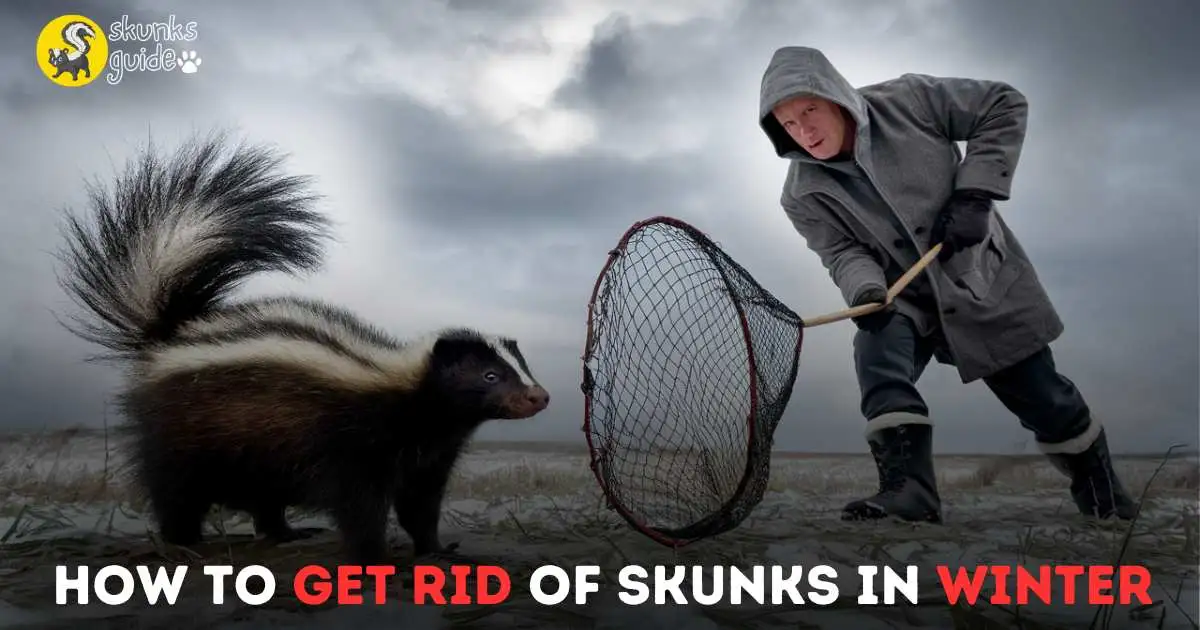How to Get Rid of Skunks in Winter?
After years of studying skunks in the wild, I’ve found that these critters are especially active during the cold season, searching for warmth and food. But with the right steps—like blocking entry points and getting rid of food—you can keep them away. In this article, I’ll show you the best ways to protect your home from skunks all winter long.
Identifying Skunk Presence
Recognizing skunks in winter is vital for effective removal. They can invade homes and yards seeking warmth and food. Knowing the signs of their presence helps in addressing the problem quickly.
Signs Of Skunk Activity
Look for these common signs of skunk activity:
- Strong Odor: Skunks emit a strong, unpleasant smell.
- Digging: They dig in gardens or under decks.
- Food Scraps: Empty food bowls or overturned trash cans.
- Noise: Disturbances at night, including hissing or growling.
Skunk Tracks And Markings
Identifying skunk tracks helps confirm their presence. Skunks have unique footprints:
| Feature | Description |
|---|---|
| Size | About 2.5 inches long. |
| Shape | Round with five toes. |
| Claw Marks | Visible but often faint. |
Look for scratching marks on trees or fences. Skunks often use these surfaces to mark their territory. Their urine may also leave a distinct scent.
Understanding Skunk Behavior In Winter
Skunks behave differently in winter. They adapt to colder weather. Understanding their patterns helps in effective removal. Focus on hibernation and foraging habits.
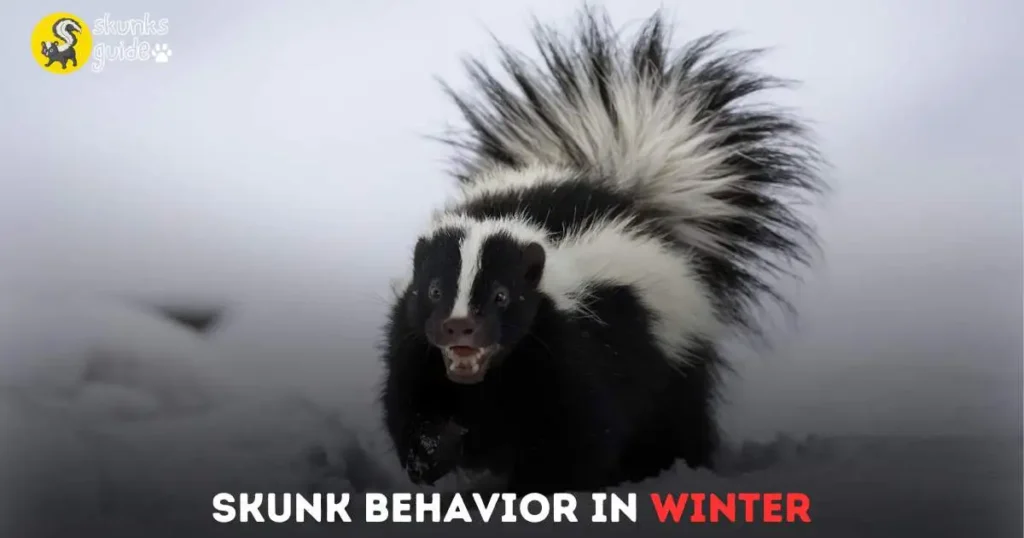
Skunk Hibernation Patterns
Skunks do not truly hibernate. They enter a state called torpor. This means they sleep a lot but can wake up easily. Here are key points about their hibernation:
- Skunks find warm, sheltered places.
- They may use burrows or abandoned dens.
- They reduce their activity during extreme cold.
During mild winter days, skunks may leave their dens. They search for food or water. They are less active overall.
Skunk Foraging Habits
Skunks are opportunistic feeders. They eat what is available. Here are common food sources:
| Food Type | Description |
|---|---|
| Insects | Skunks love grubs and beetles. |
| Fruits | They enjoy berries and fallen apples. |
| Small Animals | Skunks may hunt rodents or rabbits. |
| Human Food | They scavenge from trash cans. |
Foraging occurs mostly at night. They are active in search of food. This activity can lead to conflicts with humans.
Preventive Measures
Preventive measures are essential for keeping skunks away during winter. By taking a few simple steps, homeowners can reduce skunk activity. This section covers two key strategies: securing food sources and fortifying structures.
Securing Food Sources
Skunks are attracted to easy food. Removing food sources helps deter them. Here are some effective ways to secure food:
- Store pet food indoors. Don’t leave it outside.
- Seal garbage cans tightly. Use containers with secure lids.
- Clean up spills immediately. This includes birdseed and pet food.
- Remove fallen fruit from yards. Skunks love fruit.
- Compost responsibly. Avoid composting meat and dairy.
Fortifying Structures
Skunks can enter homes and sheds easily. Fortifying structures prevent them from getting inside. Use these tips:
- Seal entry points. Check for gaps or holes.
- Repair fences. Ensure they are tall and buried underground.
- Close vents and openings. Use wire mesh for extra protection.
- Inspect basements. Look for cracks and holes.
- Store firewood away from the house. Skunks often hide in stacks.
Implementing these preventive measures can greatly reduce skunk problems. Protect your home and yard from unwelcome visitors this winter!
Exclusion Techniques
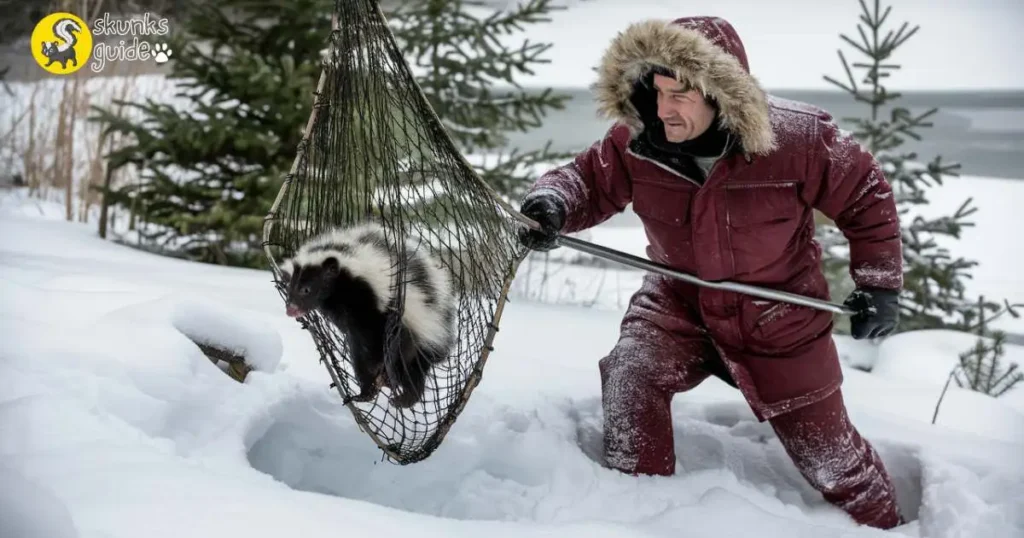
Exclusion techniques are effective methods to prevent skunks from invading your property. These techniques focus on keeping skunks out rather than removing them once they’re inside. Implementing these strategies can ensure a skunk-free environment during winter.
Installing Fences
Fences can be a strong barrier against skunks. Here are some tips to consider:
- Height: Install fences at least 3 feet high.
- Material: Use sturdy materials like wood or metal.
- Buried Edge: Bury the bottom of the fence 12 inches underground.
- Overhang: Create an overhang that angles outward.
These steps will make it harder for skunks to dig under or climb over the fence.
Sealing Entry Points
Skunks often enter homes through small openings. Sealing these entry points is crucial. Follow these steps:
- Inspect your property for holes or gaps.
- Seal openings larger than 3 inches with materials like:
- Steel mesh
- Concrete
- Wood
- Close off vents and chimneys properly.
- Ensure doors and windows close tightly.
Regular checks can help maintain a skunk-proof home.
Trapping And Relocation
Trapping and relocating skunks is an effective way to manage their presence in winter. This method helps ensure safety for both humans and animals. Understanding the right techniques is vital for success.
Humane Trapping Methods
Humane trapping protects skunks and minimizes stress. Here are some effective methods:
- Live Traps: Use large, sturdy traps. Bait them with fruits, peanut butter, or cat food.
- Placement: Set traps near skunk burrows or feeding areas.
- Check Regularly: Inspect traps daily to avoid unnecessary suffering.
After catching a skunk, follow these steps:
- Wear gloves to prevent scent transfer.
- Cover the trap with a blanket for calmness.
- Transport the skunk to a suitable location away from home.
Legal Considerations
Before trapping skunks, check local laws. Regulations vary by location. Some areas require permits for trapping. Others may prohibit the relocation of trapped skunks.
Use Natural Repellents
- Citrus Peels: Scatter citrus peels around areas where skunks are active. The strong scent is unpleasant for them and can deter them from sticking around.
- Ammonia-Soaked Rags: Place ammonia-soaked rags in and around suspected skunk shelters. The strong odor will encourage skunks to leave.
- Commercial Repellents: There are several skunk repellents available that use predator urine or other natural ingredients. These can be effective but should be applied regularly, especially after snowfall.
Dealing With Skunk Damage
Skunks can cause significant damage to your property. They dig holes, create messes, and leave unpleasant odors. Prompt action is essential to restore your space and prevent further issues.
Restoring Property
Skunk damage can affect lawns, gardens, and even structures. Here are steps to restore your property:
- Assess the Damage: Walk around your property. Look for holes or disturbed areas.
- Fill in Holes: Use soil to fill any holes. Compact it well.
- Replant Grass: If grass is damaged, reseed those areas. Water them regularly.
- Remove Debris: Clear away any skunk-related mess. This prevents attracting more pests.
Odor Neutralization
The smell of skunk spray is strong and lingering. Removing the odor is crucial. Use these methods:
- Vinegar Solution: Mix equal parts vinegar and water. Spray it on affected areas.
- Baking Soda: Sprinkle baking soda on surfaces. Let it sit for a few hours, then vacuum.
- Commercial Odor Removers: Look for products specifically designed for skunk odor.
Follow these tips to eliminate odors:
| Method | Effectiveness |
|---|---|
| Vinegar Solution | High |
| Baking Soda | Medium |
| Commercial Products | Varies |
Act quickly to restore your property. Effective measures will help you enjoy your space again.
Professional Removal Services
Dealing with skunks in winter can be tough. Using professional removal services ensures safety and effectiveness. Experts know how to handle skunks properly. They use safe methods to remove skunks without harm.
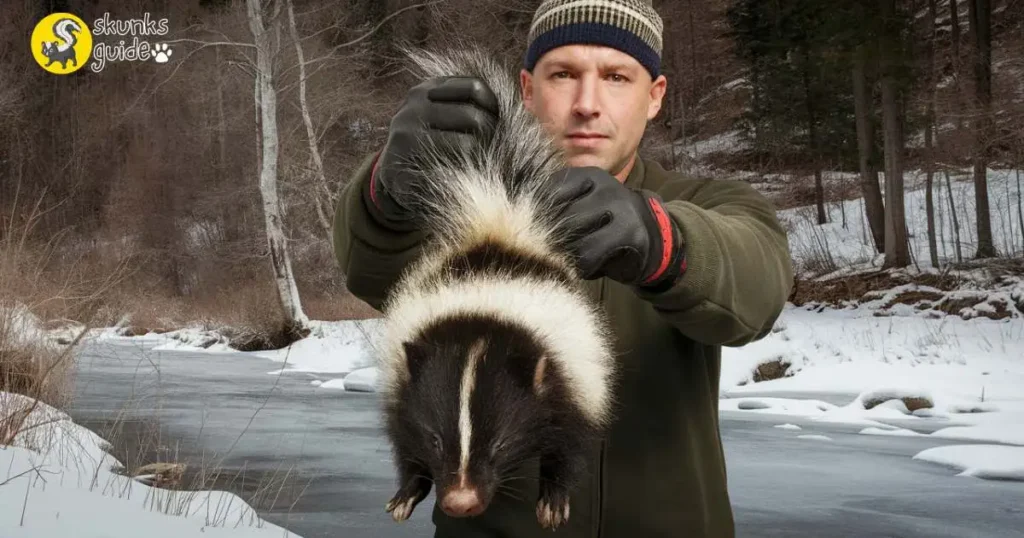
When To Call Experts
Recognizing the right time to call experts is crucial. Here are some signs:
- Skunk activity near your home.
- Strong skunk odor lingering around.
- Repeated damage to your yard or garden.
- Presence of baby skunks.
Winter is a common time for skunks to seek shelter. They may invade your space to escape the cold. Calling professionals can prevent future problems.
Selecting A Wildlife Control Professional
Choosing the right wildlife control professional is important. Consider these factors:
| Criteria | Details |
|---|---|
| Experience | Look for years of experience in skunk removal. |
| License | Ensure they have the required licenses to operate. |
| Techniques | Ask about humane removal techniques used. |
| Reviews | Check online reviews and testimonials from clients. |
| Cost | Request quotes to compare prices and services. |
Make sure the professional follows local wildlife laws. This ensures the removal is safe and legal. A good professional will provide a plan and follow-up services.
Long-term Skunk Deterrence
Keeping skunks away in winter requires long-term strategies. Simple changes can make a big difference. Focus on your landscape and community efforts. Both play vital roles in deterring skunks effectively.
Landscape Changes
Modify your yard to discourage skunks. Implement these landscape changes:
- Remove food sources: Clear fallen fruit and pet food.
- Seal trash bins: Use tight-fitting lids to prevent access.
- Trim bushes: Reduce hiding spots by keeping shrubs tidy.
- Install fencing: Use fences that are at least 3 feet high.
- Use motion-activated lights: Startle skunks with sudden light.
These changes discourage skunks from visiting your property. A clean, well-lit yard makes it less attractive.
Community Awareness And Cooperation
Skunk control is more effective with community efforts. Work together with neighbors to reduce skunk populations. Here are ways to promote awareness:
- Share information: Educate others about skunk behavior.
- Organize clean-up days: Collect trash and debris in the neighborhood.
- Establish a neighborhood watch: Monitor skunk sightings and report them.
- Host workshops: Teach effective deterrence methods to everyone.
Community cooperation creates a stronger defense against skunks. The more people involved, the better the results.
Winter-Specific Considerations
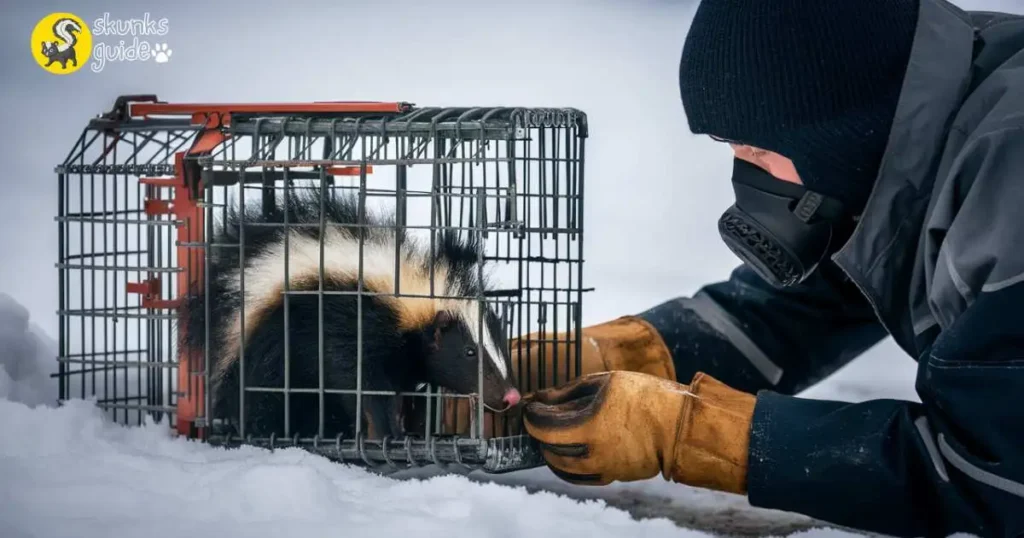
- Snow and Ice: Heavy snowfall can cover up signs of skunk activity or create new hiding spots for them. Regularly clear snow from around your home’s foundation and potential entry points.
- Hibernation: While skunks do not fully hibernate, they are less active in winter, making them harder to spot. However, they might emerge during warmer winter days, so remain vigilant.
Table: Common Skunk Repellents
| Repellent | Description | Application |
|---|---|---|
| Citrus Peels | Natural and non-toxic; skunks dislike the scent | Scatter around potential shelters |
| Ammonia-Soaked Rags | Strong odor; repels skunks from specific areas | Place in or around shelters |
| Predator Urine | Mimics scent of skunk predators, deterring them | Spray around the perimeter |
| Commercial Repellents | Formulated to repel skunks with natural ingredients | Apply as per product instructions |
By following these steps, you can effectively manage and eliminate skunks from your property during winter, ensuring they don’t become a recurring problem as the weather warms up.
Frequently Asked Questions
How Do You Get A Skunk To Leave?
To encourage a skunk to leave, remove food sources like pet food and garbage. Seal entry points to your home. Use strong scents like vinegar or citrus peels around the area. Play loud noises or use motion-activated sprinklers to deter them.
Always maintain a safe distance.
What Do Skunks Hate The Most?
Skunks hate strong smells, particularly citrus and predator scents. They avoid areas with vinegar, ammonia, and certain essential oils. Keeping these odors nearby can deter skunks from your yard. Maintaining a clean environment also helps minimize skunk attraction.
How Do You Keep Skunks Out Of Your Yard At Night?
To keep skunks out of your yard at night, secure trash cans with tight lids. Remove pet food and birdseed. Close off entry points under decks and sheds. Use motion-activated lights and sprinklers. Plant strong-smelling herbs, like lavender or mint, to deter them naturally.
Conclusion
Getting rid of skunks in winter requires patience and the right strategies. By sealing entry points and using humane traps, you can protect your property. Remember to keep food sources secure and create an unwelcoming environment. With these tips, you can successfully keep skunks away during the colder months.

